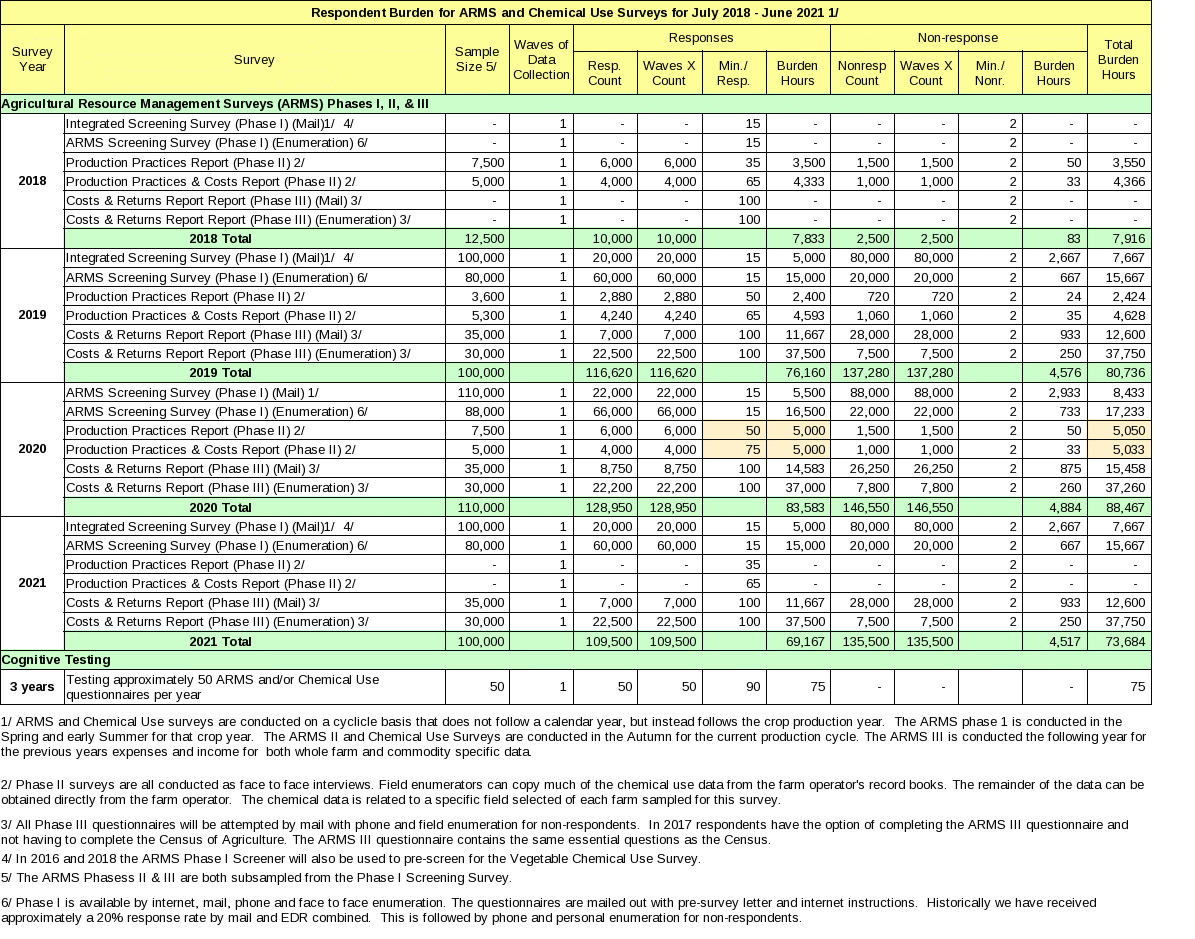Supplemental Supporting Statement Part A for ARMS II - 2020
0218 - Supplemental Supporting Statement A for ARMS II 2020.docx
Agricultural Resource Management and Chemical Use Surveys
Supplemental Supporting Statement Part A for ARMS II - 2020
OMB: 0535-0218
ARMS II and Vegetable Chemical Use Survey
Substantive Change
OMB No. 0535-0218
This substantive change is being submitted as a supplemental supporting statement to the Agricultural Resource Management and Chemical Use Surveys (ARMS).
A. JUSTIFICATION
Circumstances making collection of information necessary.
NASS is requesting a substantive change to the ARMS and Chemical Use Survey docket (0535-0218) to accommodate changes to several of the questionnaires.
NASS was approached by the Office of Pest Management Policy (OPMP), the Economic Research Service (ERS) and the Mississippi State University Extension Service (MSUES) through cooperative agreements to make changes to the ARMS II, the Vegetable Chemical Use surveys and the Mississippi Cropping Practices Surveys for Corn, Cotton, Rice, Soybeans, and/or Wheat for 2020.
The OPMP was created by the Agricultural Research, Extension, and Education Reform Act of 1998 in response to grower concerns about the implementation of the Food Quality Protection Act of 1996 (FQPA). By 1998 statute, and as reauthorized in the Agricultural Act of 2014 (P.L. 113-79), OPMP “shall be responsible for
the development and coordination of Department policy on pest management and pesticides;
the coordination of activities and services of the Department, including research, extension, and education activities, regarding the development, availability, and use of economically and environmentally sound pest management tools and practices;
assisting other agencies of the Department in fulfilling their responsibilities related to pest management or pesticides under the Food Quality Protection Act of 1996, the Federal Food, Drug and Cosmetic Act and other applicable laws;
perform other functions as required by law of by request of the Secretary;
ensure coordination of interagency activities with EPA and FDA and other Federal and state agencies; and
consult with agricultural producers that may be affected by pest management or pesticide-related activities or actions of the Department or other agencies.”
OPMP and ERS provide supplemental funding to NASS to offset a portion of the data collection costs for the ARMS and Chemical Use Surveys. In return, NASS adds supplemental questions to our questionnaires to address changes in research questions that occur each year regarding changes in the farming industry.
The additional questions that will be added to the questionnaires will address topics such as seed treatments, GPS enabled equipment, nutrient management, crop insurance, environmental regulations, organic production practices, etc. Complete listings of the questions added and deleted have been added as supplemental documents to this submission.
The Cropping Practices Surveys that are conducted for Mississippi State University are done under an external project agreement, where they provide complete funding for these surveys.
How, by whom, and for what purpose information is to be used.
OPMP, ERS, and MSUES will be able to better address changes in the farming practices that have occurred since the original approval of this docket.
Use of improved information technology.
The ARMS II and Vegetable Chemical Use Surveys are done by phone and field enumeration. These changes to the questionnaires will not change anything as far use of technology.
4. Efforts to identify duplication.
There are no changes from the original approval related to duplication reduction.
Methods to minimize burden of small businesses.
NASS incorporated additional screening questions and skip patterns to help minimize additional burden as much as possible.
Consequence if information collection were less frequent.
There are no changes to the frequency of these surveys than was originally approved.
Special circumstances.
No special circumstances are associated with this information collection.
Federal register notice and consultation with outside persons.
Not applicable.
Payments or gifts to respondents.
No payments or gifts will be given to respondents.
Confidentiality provided to respondents.
Confidentiality will be provided to respondents in accordance with the Confidential Information Protection and Statistical Efficiency Act (CIPSEA) of 2002. All confidentially protections that are applied to all products released from these surveys will remain the same as originally approved.
Questions of a sensitive nature.
No questions of sensitive nature will be asked.
12. Hour burden and annualized costs to respondents.
The following table contains the estimated burden hours for the surveys included in this supplemental supporting statement. Cost to the public for completing the questionnaire is assumed to be comparable to the hourly rate of those requesting the data. The adjusted overall cost to the public is estimated at $3,933,627.84.

NASS uses the Bureau of Labor Statistics’ Occupational Employment Statistics (most recently published on March 29, 2019 for the previous May) to estimate an hourly wage for the burden cost. The May 2018 mean wage for bookkeepers was $20.25. The mean wage for farm managers was $38.43. The mean wage for farm supervisors was $24.42. The mean wage of the three is $27.70. To calculate the fully loaded wage rate (includes allowances for Social Security, insurance, etc.) NASS will add 33% for a total of $36.84 per hour.
Original Burden Tables
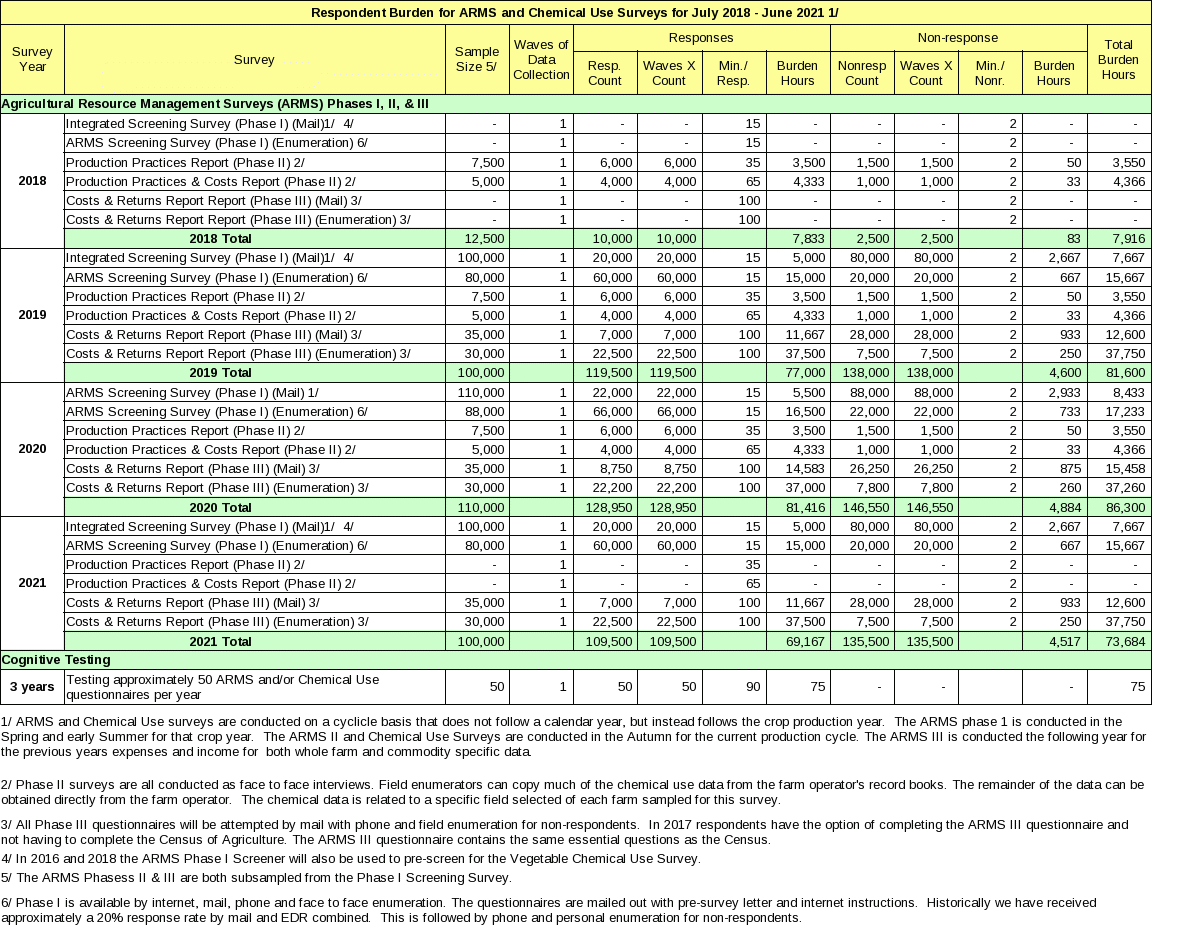
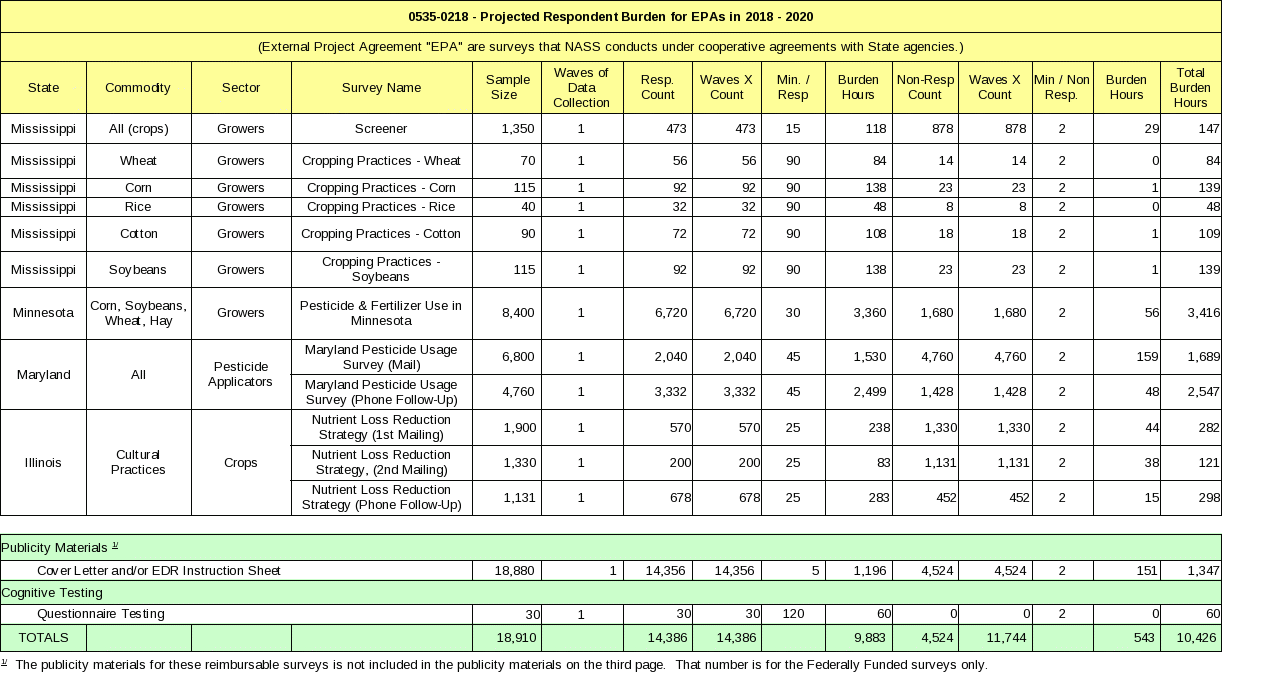
Revisions for 2020 - sheet 3
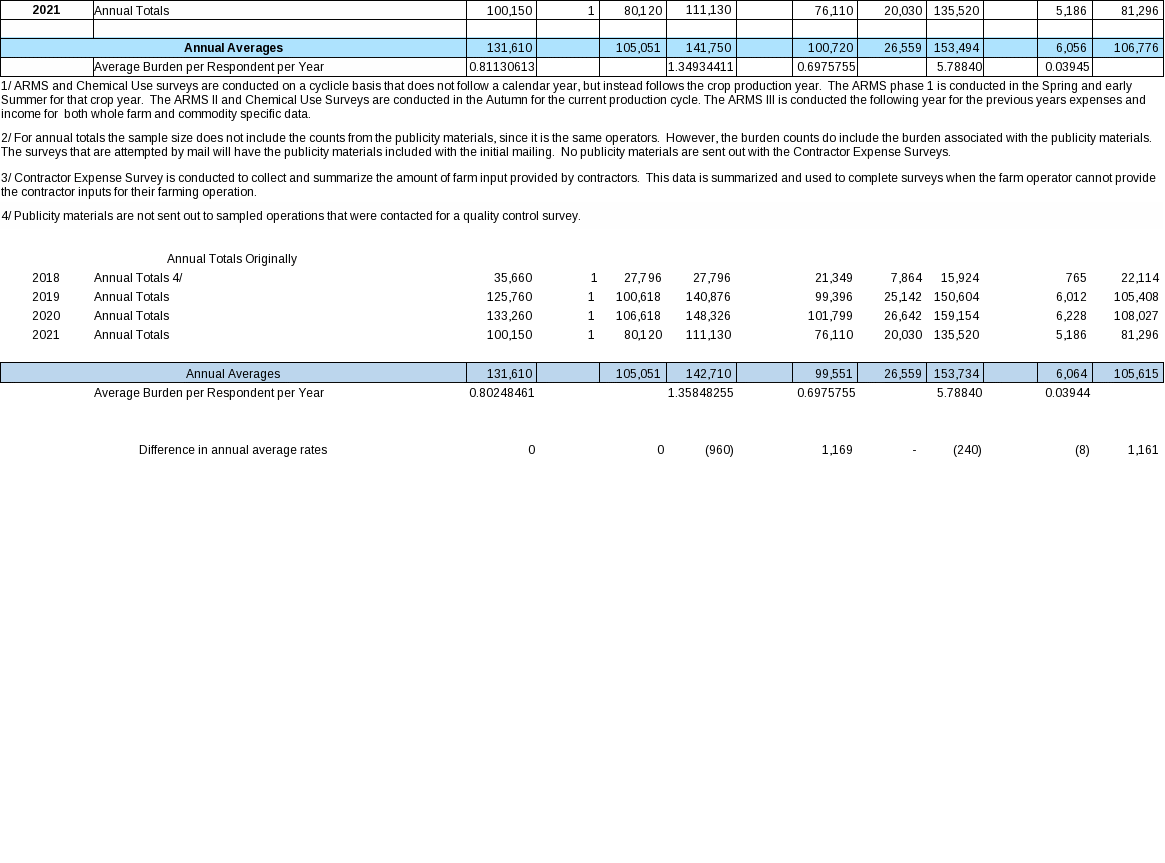
Total annual cost burden to respondents.
No start-up or ongoing operation/maintenance costs are associated with this information collection.
Annualized costs to federal government.
There are no changes to the total annual cost of $18 million for the Agricultural Resource Management Surveys and the Chemical Use programs as a result of these changes.
Reasons for changes in burden.
Based on the ARMS II and the Fruit Chemical Use surveys conducted in 2019, in which the field enumerators were asked to record beginning and ending times for personal interviews the changes in average burden per questionnaire is reported in the table below.
For the Cropping Practices Surveys conducted for the Mississippi State University there are no overall changes in burden resulting from changes to those questionnaires.
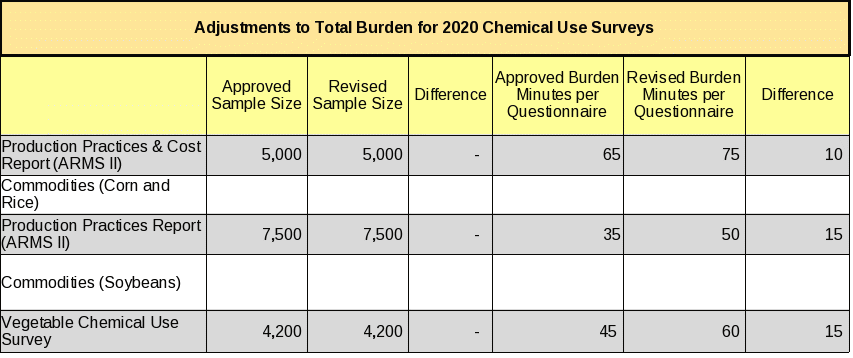
Tabulation, analysis, and publication plans.
The changes to the questionnaires will be incorporated in the publications that are listed in the original approval docket.
Request for approval of non-display of expiration date.
No request is being made for approval of non-display of the expiration date.
18. Exceptions to certification statement.
No exceptions to the certification statement are requested.
April 2020
| File Type | application/vnd.openxmlformats-officedocument.wordprocessingml.document |
| Author | HancDa |
| File Modified | 0000-00-00 |
| File Created | 2022-06-22 |
© 2026 OMB.report | Privacy Policy
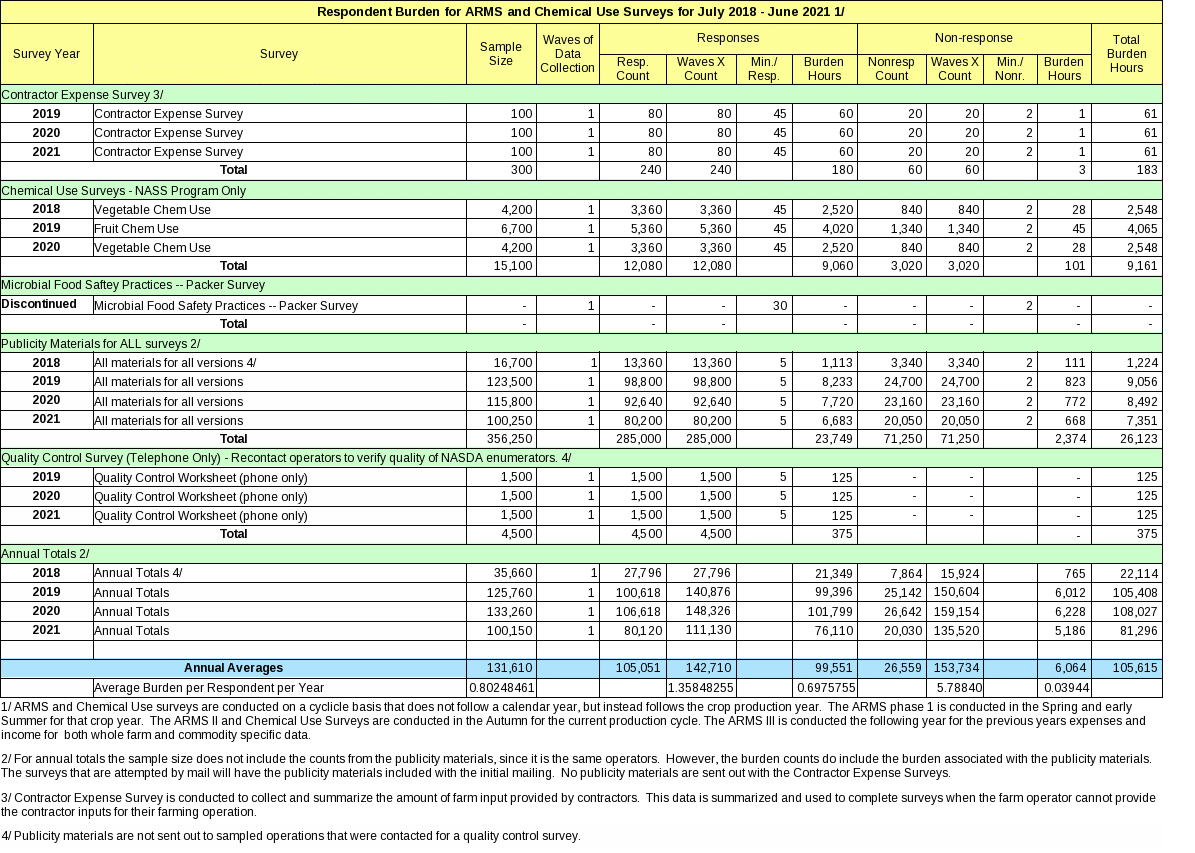 Revisions
for 2020 – sheet 1
Revisions
for 2020 – sheet 1
